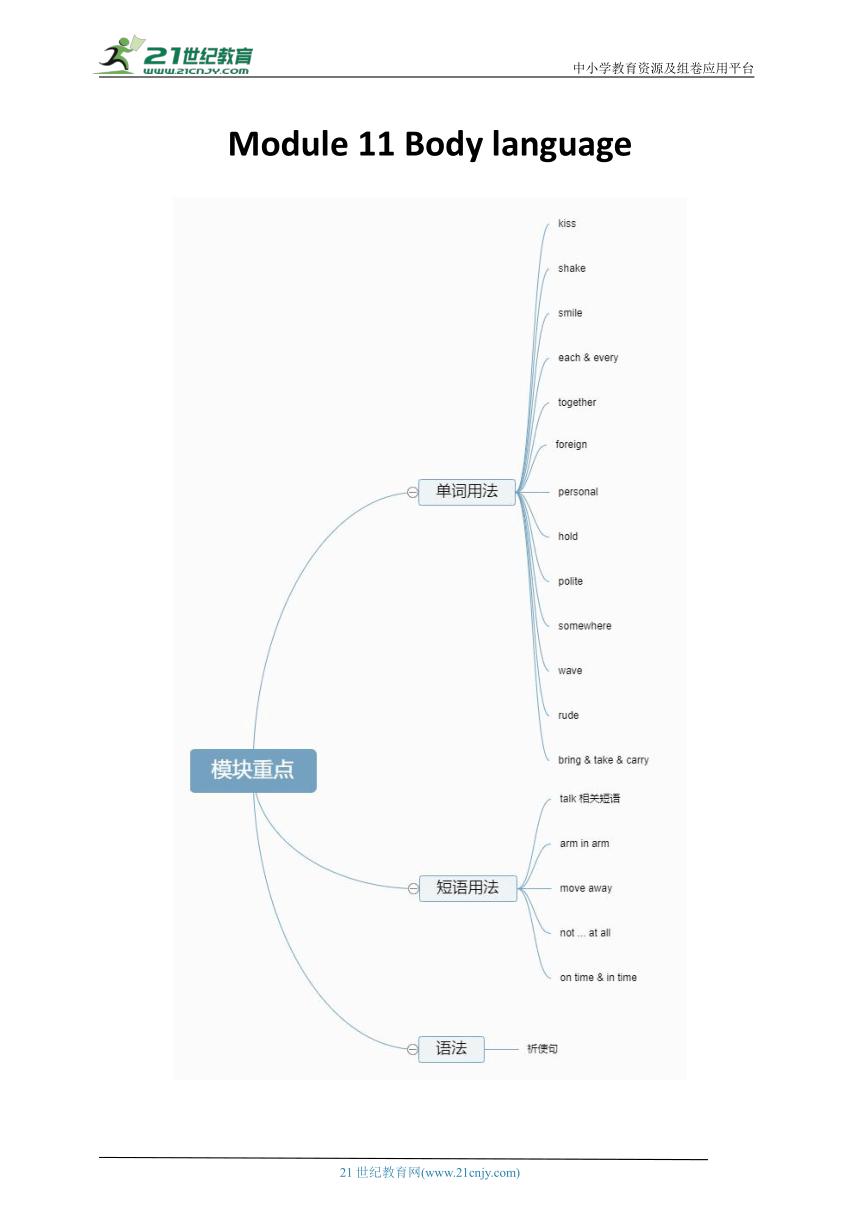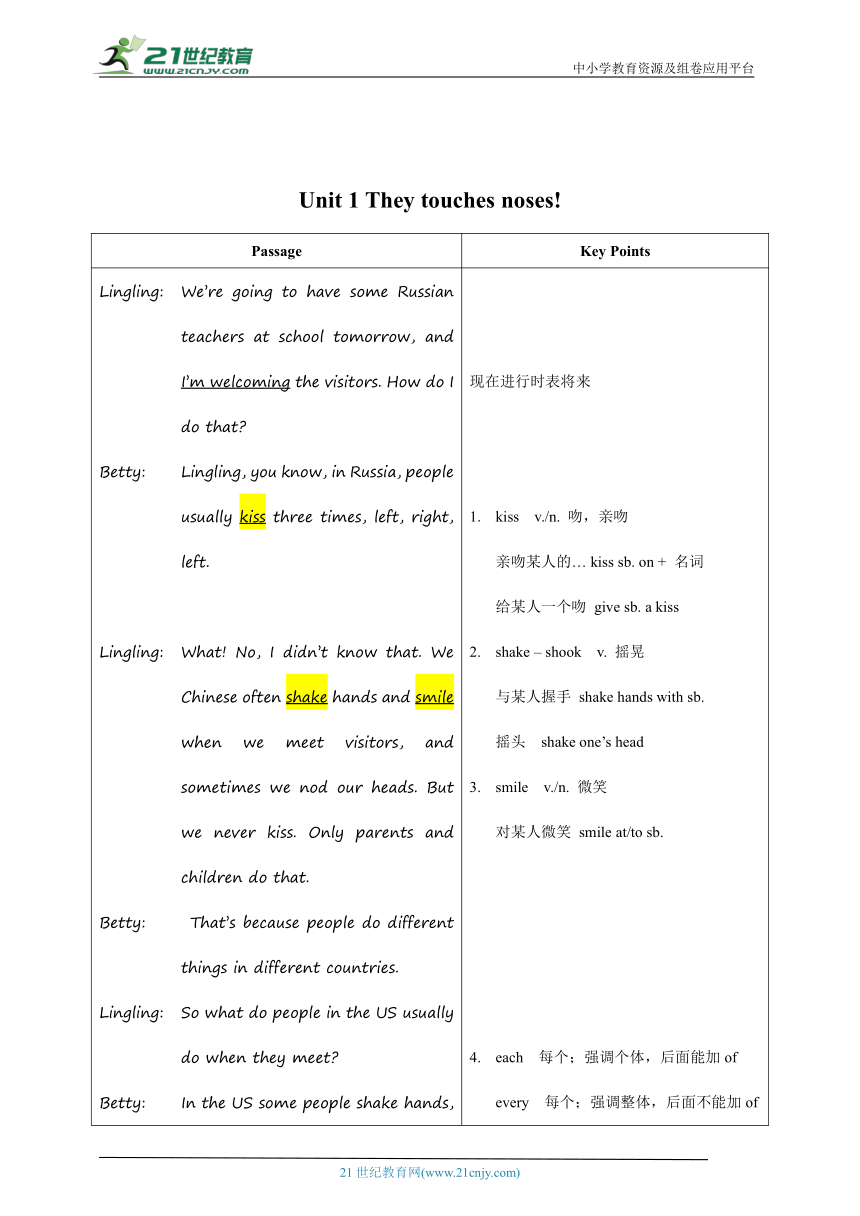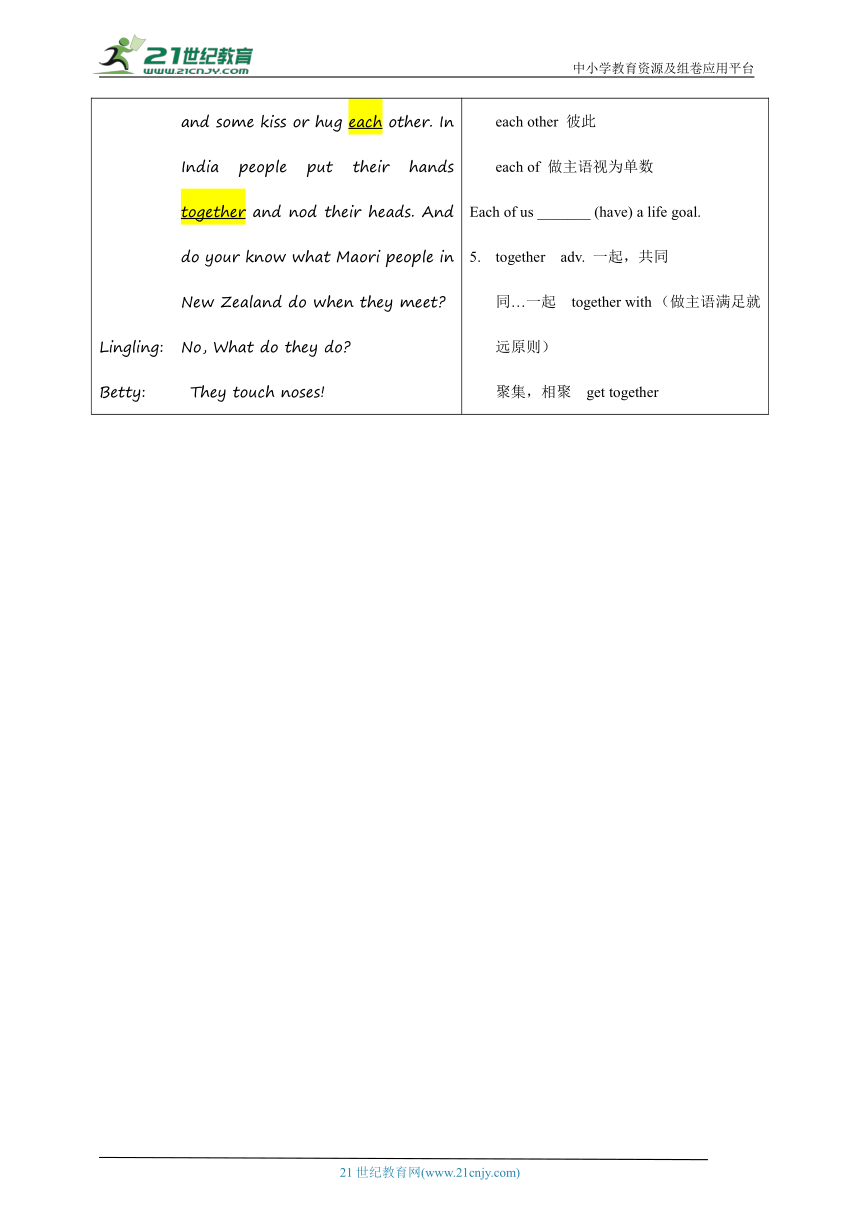(外研版)七年级下册 Module 11 Body language 讲义
文档属性
| 名称 | (外研版)七年级下册 Module 11 Body language 讲义 |

|
|
| 格式 | doc | ||
| 文件大小 | 230.2KB | ||
| 资源类型 | 试卷 | ||
| 版本资源 | 外研版 | ||
| 科目 | 英语 | ||
| 更新时间 | 2022-06-29 00:00:00 | ||
图片预览



文档简介
中小学教育资源及组卷应用平台
Module 11 Body language
Unit 1 They touches noses!
Passage Key Points
Lingling: We’re going to have some Russian teachers at school tomorrow, and I’m welcoming the visitors. How do I do that Betty: Lingling, you know, in Russia, people usually kiss three times, left, right, left. Lingling: What! No, I didn’t know that. We Chinese often shake hands and smile when we meet visitors, and sometimes we nod our heads. But we never kiss. Only parents and children do that.Betty: That’s because people do different things in different countries.Lingling: So what do people in the US usually do when they meet Betty: In the US some people shake hands, and some kiss or hug each other. In India people put their hands together and nod their heads. And do your know what Maori people in New Zealand do when they meet Lingling: No, What do they do Betty: They touch noses! 现在进行时表将来kiss v./n. 吻,亲吻亲吻某人的… kiss sb. on + 名词给某人一个吻 give sb. a kissshake – shook v. 摇晃与某人握手 shake hands with sb.摇头 shake one’s headsmile v./n. 微笑对某人微笑 smile at/to sb. each 每个;强调个体,后面能加ofevery 每个;强调整体,后面不能加ofeach other 彼此each of 做主语视为单数Each of us _______ (have) a life goal. together adv. 一起,共同同…一起 together with (做主语满足就远原则)聚集,相聚 get together
Unit 2 Here some ways to welcome them.
Passage Key Points
Body language around the worldby Wang LinglingOur new foreign students are going to arrive very soon, and here are some ways to welcome them.How close do you stand when you talk to a friend You can stand too close to people in the Middle East but don’t stand too close to North Americans! Give them more personal space.How about touching people Chinese girls often walk arm in arm with their friends. South Americans sometimes hold your arm when they talk to you, so you can’t move away! But in Britain many people don’t like other people to touch them at all.Do you look at people when you talk In some places, it isn’t polite to look at people when they talk, but in other countries it isn’t polite to look somewhere else. In Britain and the US, people usually look at each other when they talk.And how do you say goodbye That’s easy, wave to say goodbye. But be careful! In Greece, it’s not at all polite! In fact, it’s very rude! foreign adj. 外国的foreigner n. 外国人talk to/with sb. 和某人交流谈论某人/某事 talk about ab./sth.too adv. 太,也close to 接近 personal adj. 个人的person n. 人亲自 in person arm in arm 臂挽臂的hand in hand 手挽手face to face 面对面的back to back 背靠背shoulder to shoulder 肩并肩heart to heart 心连心side by side 并排hold – held v. 握着,占据,容纳move away 搬开,挪走put away 收起来take away 拿走keep away 远离move to 搬到某地 move on 进步,前进move in 搬入 move out搬出not … at all 一点也不,用于否定句,表强调not at all 不用谢,不客气polite adj. 礼貌的【反】impolite adj. 不礼貌的politely adv. 礼貌地对某人有礼貌 be polite to sb. 做某事是有礼貌的 It’s polite to do sth. somewhere adv. 某处,某个地方形容词修饰somewhere 放后面wave v. 挥/摆/招(手)挥手告别 wave to say goodbye = wave good bye = say goodbye to sb. in fact 事实上rude adj. 粗鲁的,无礼的rudeness n. 粗鲁,无礼rudely adv. 粗鲁地,无礼地对某人粗鲁 be rude to sb. 做某事是粗鲁的 it’s rude to do sth.
Unit 3 Language in use
--祈使句
观察下列句子
Bring me some sugar.
Please listen to me.
Be on time.
Let’s go back.
This way, please.
No smoking.
Don’t do that.
Let’s not play games.
祈使句的肯定句 祈使句的否定句式
(Please) + V原… (Please) don’t /never +V原
Be动词 +… Don’t + be + …
Let sb. do sth Let’s not do sth.
无动词的祈使句 No + V-ing/n. 表禁止
bring v. 带来;给某人带来某物bring sb. sth. = bring sth. for sb. take v. 带走;carry v. 拿,带;强调动作,不说明动作的方向on time 准时,按时in time 及时
21世纪教育网 www.21cnjy.com 精品试卷·第 2 页 (共 2 页)
HYPERLINK "http://21世纪教育网(www.21cnjy.com)
" 21世纪教育网(www.21cnjy.com)
Module 11 Body language
Unit 1 They touches noses!
Passage Key Points
Lingling: We’re going to have some Russian teachers at school tomorrow, and I’m welcoming the visitors. How do I do that Betty: Lingling, you know, in Russia, people usually kiss three times, left, right, left. Lingling: What! No, I didn’t know that. We Chinese often shake hands and smile when we meet visitors, and sometimes we nod our heads. But we never kiss. Only parents and children do that.Betty: That’s because people do different things in different countries.Lingling: So what do people in the US usually do when they meet Betty: In the US some people shake hands, and some kiss or hug each other. In India people put their hands together and nod their heads. And do your know what Maori people in New Zealand do when they meet Lingling: No, What do they do Betty: They touch noses! 现在进行时表将来kiss v./n. 吻,亲吻亲吻某人的… kiss sb. on + 名词给某人一个吻 give sb. a kissshake – shook v. 摇晃与某人握手 shake hands with sb.摇头 shake one’s headsmile v./n. 微笑对某人微笑 smile at/to sb. each 每个;强调个体,后面能加ofevery 每个;强调整体,后面不能加ofeach other 彼此each of 做主语视为单数Each of us _______ (have) a life goal. together adv. 一起,共同同…一起 together with (做主语满足就远原则)聚集,相聚 get together
Unit 2 Here some ways to welcome them.
Passage Key Points
Body language around the worldby Wang LinglingOur new foreign students are going to arrive very soon, and here are some ways to welcome them.How close do you stand when you talk to a friend You can stand too close to people in the Middle East but don’t stand too close to North Americans! Give them more personal space.How about touching people Chinese girls often walk arm in arm with their friends. South Americans sometimes hold your arm when they talk to you, so you can’t move away! But in Britain many people don’t like other people to touch them at all.Do you look at people when you talk In some places, it isn’t polite to look at people when they talk, but in other countries it isn’t polite to look somewhere else. In Britain and the US, people usually look at each other when they talk.And how do you say goodbye That’s easy, wave to say goodbye. But be careful! In Greece, it’s not at all polite! In fact, it’s very rude! foreign adj. 外国的foreigner n. 外国人talk to/with sb. 和某人交流谈论某人/某事 talk about ab./sth.too adv. 太,也close to 接近 personal adj. 个人的person n. 人亲自 in person arm in arm 臂挽臂的hand in hand 手挽手face to face 面对面的back to back 背靠背shoulder to shoulder 肩并肩heart to heart 心连心side by side 并排hold – held v. 握着,占据,容纳move away 搬开,挪走put away 收起来take away 拿走keep away 远离move to 搬到某地 move on 进步,前进move in 搬入 move out搬出not … at all 一点也不,用于否定句,表强调not at all 不用谢,不客气polite adj. 礼貌的【反】impolite adj. 不礼貌的politely adv. 礼貌地对某人有礼貌 be polite to sb. 做某事是有礼貌的 It’s polite to do sth. somewhere adv. 某处,某个地方形容词修饰somewhere 放后面wave v. 挥/摆/招(手)挥手告别 wave to say goodbye = wave good bye = say goodbye to sb. in fact 事实上rude adj. 粗鲁的,无礼的rudeness n. 粗鲁,无礼rudely adv. 粗鲁地,无礼地对某人粗鲁 be rude to sb. 做某事是粗鲁的 it’s rude to do sth.
Unit 3 Language in use
--祈使句
观察下列句子
Bring me some sugar.
Please listen to me.
Be on time.
Let’s go back.
This way, please.
No smoking.
Don’t do that.
Let’s not play games.
祈使句的肯定句 祈使句的否定句式
(Please) + V原… (Please) don’t /never +V原
Be动词 +… Don’t + be + …
Let sb. do sth Let’s not do sth.
无动词的祈使句 No + V-ing/n. 表禁止
bring v. 带来;给某人带来某物bring sb. sth. = bring sth. for sb. take v. 带走;carry v. 拿,带;强调动作,不说明动作的方向on time 准时,按时in time 及时
21世纪教育网 www.21cnjy.com 精品试卷·第 2 页 (共 2 页)
HYPERLINK "http://21世纪教育网(www.21cnjy.com)
" 21世纪教育网(www.21cnjy.com)
同课章节目录
- Module 1 Lost and found
- Unit 1 Whose bag is this?
- Unit 2 Are they yours?
- Unit 3 Language in use
- Module 2 What can you do ?
- Unit 1 I can play the piano
- Unit 2 I can run really fast
- Unit 3 Language in use
- Module 3 Making plans
- Unit 1 What are you going to do at the weekends?
- Unit 2 We're going to cheer the players.
- Unit 3 Language in use
- Module 4 Life in the future
- Unit 1 Everyone will study at home
- Unit 2 Every family will have a small plane.
- Unit 3 Language in use
- Module 5 Shopping
- Unit 1 What can I do for you?
- Unit 2 You can buy everything on the Internet
- Unit 3 Language in use
- Module 6 Around town
- Unit 1 Could you tell me how to get to the Nationa
- Unit 2 The London Eye is on your right.
- Unit 3 Language in use
- Revision module A
- Module 7 My past life
- Unit 1 I was born in a small village.
- Unit 2 I was born in Quincy.
- Unit 3 Language in use
- Module 8 Story time
- Unit 1 Once upon a time….
- Unit 2 Goldilocks hurried out of the house.
- Unit 3 Language in use
- Module 9 Life history
- Unit 1 He left school and began work at the age of
- Unit 2 He decided to be an actor.
- Unit 3 Language in use
- Module 10 A holiday journey
- Unit 1 What did you do?
- Unit 2 This morning we took a walk.
- Unit 3 Language in use
- Module 11 Body language
- Unit 1 They touch noses!
- Unit 2 Here are some ways to welcome them.
- Unit 3 Language in use
- Module 12 Western music
- Unit 1 It's so beautiful!
- Unit 2 Vienna is the centre of European classical
- Unit 3 Language in use
- Revision module B
